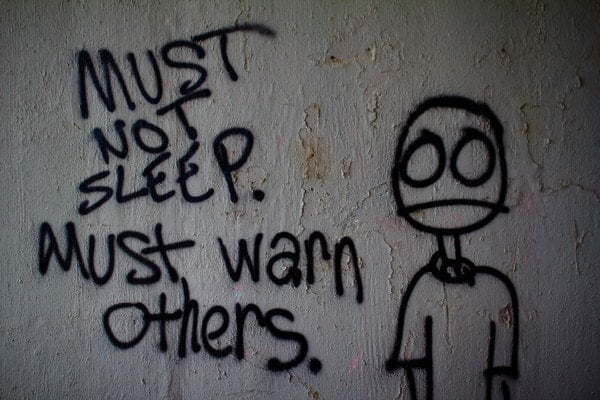
This website uses cookies to improve your experience. We'll assume you're ok with this, but you can opt-out if you wish. Read More
The Next Round: What happens after you change your drinking?

Sleep comes up a lot in the Club Soda community, the instantaneous need for it or the lack thereof to conk out after a few too many. It either hits you like a tonne of bricks, exhaustion seeping into your joints, and you could sleep for England. Or you’re left staring at the ceiling for hours, your mind going to all the anxious corners of our thoughts.
However, we also know how drinking alcohol affects our sleep. Having a drink before bed, might help us fall asleep but what follows is not so restful. Waking up at 2, 3 and/or 4 a.m, tossing and turning, gasping for water. Sound familiar? Even just a glass or two of your favourite tipple can cause you to miss out on the important stages of sleep, meaning you sleep more lightly. So, when we stop drinking, we’re kinda expecting sleep is a given. But what if it’s not?
You may be feeling some of these…
This could be caused by…
A night on the booze will most likely cause you to sleep deeper during the first part of the night, but later on the chances are you will be more restless than usual. This is known as the rebound effect. Alcohol is a fast acting drug, quickly entering the bloodstream and reaching the brain within minutes. But the effects are short lived. The liver quickly metabolises the alcohol and any sleepiness you felt quickly wears off. Once your Blood Alcohol Content goes down, sleep variables are reversed, leading to disturbed sleep. This is often the reason why drinkers often find themselves wide awake in the early hours of the morning.
In making big life changes by cutting back or quitting alcohol, having trouble sleeping or feeling drowsy, can leave us tired and irritable, weakening our resolve. After a few weeks, the majority of people report that their sleep does get better and they feel much more rested. The ability to enjoy a full night’s sleep and return to a normal sleep pattern can be one of the first signs that you are settling into a more sober life.
Mindfulness expert Andy Hix tells us about his experience of using Mindfulness Techniques towards a better sleep in ‘How mindful sleeping can help your mindful drinking’,
“My view was challenged by something I read in Arianna Huffington’s book, Thrive. There was a whole chapter on the importance of sleep and how not getting enough reduces your emotional intelligence, self-regard, assertiveness, sense of independence, empathy, interpersonal relationships, positive thinking and impulse control. I knew it was important but I didn’t realise it was that important!”
By going to bed an hour and a half earlier than usual (foregoing his usual tv sessions, social media scrolling and last email hits), he found that he was brighter the next day for it. By increasing his sleep, he has also cut out those jugs of caffeine mid-morning and afternoon, improving his concentration levels and ability to meditate. Andy adds, “Of course, once you’ve gone to bed, there’s the problem of actually going to sleep. Our minds are so hyperactive and over stimulated during the day, it’s little wonder many people find it hard to switch them off at night.”
This website uses cookies to improve your experience. We'll assume you're ok with this, but you can opt-out if you wish. Read More
| Name | Domain | Purpose | Expiry | Type |
|---|---|---|---|---|
| wpl_user_preference | joinclubsoda.com | WP GDPR Cookie Consent Preferences. | 1 year | HTTP |
| PHPSESSID | www.tickettailor.com | PHP generic session cookie. | 55 years | HTTP |
| AWSALB | www.tickettailor.com | Amazon Web Services Load Balancer cookie. | 7 days | HTTP |
| YSC | youtube.com | YouTube session cookie. | 55 years | HTTP |
| Name | Domain | Purpose | Expiry | Type |
|---|---|---|---|---|
| VISITOR_INFO1_LIVE | youtube.com | YouTube cookie. | 6 months | HTTP |
| Name | Domain | Purpose | Expiry | Type |
|---|---|---|---|---|
| _ga | joinclubsoda.com | Google Universal Analytics long-time unique user tracking identifier. | 2 years | HTTP |
| sbjs_migrations | joinclubsoda.com | Sourcebuster tracking cookie | 55 years | HTTP |
| sbjs_current_add | joinclubsoda.com | Sourcebuster tracking cookie | 55 years | HTTP |
| sbjs_first_add | joinclubsoda.com | Sourcebuster tracking cookie | 55 years | HTTP |
| sbjs_current | joinclubsoda.com | Sourcebuster tracking cookie | 55 years | HTTP |
| sbjs_first | joinclubsoda.com | Sourcebuster tracking cookie | 55 years | HTTP |
| sbjs_udata | joinclubsoda.com | Sourcebuster tracking cookie | 55 years | HTTP |
| sbjs_session | joinclubsoda.com | SourceBuster Tracking session | Session | HTTP |
| Name | Domain | Purpose | Expiry | Type |
|---|---|---|---|---|
| mailchimp_landing_site | joinclubsoda.com | Mailchimp functional cookie | 28 days | HTTP |
| __cf_bm | tickettailor.com | Generic CloudFlare functional cookie. | Session | HTTP |
| NID | google.com | Google unique id for preferences. | 6 months | HTTP |
| Name | Domain | Purpose | Expiry | Type |
|---|---|---|---|---|
| _ga_10XZMT03ZM | joinclubsoda.com | --- | 2 years | --- |
| AWSALBCORS | www.tickettailor.com | --- | 7 days | --- |
| cf_clearance | tickettailor.com | --- | 1 year | --- |
| VISITOR_PRIVACY_METADATA | youtube.com | --- | 6 months | --- |
Join Club Soda for 10% off your first order of drinks for UK delivery. Plus get our latest news and special offers for members to choose better drinks, change your drinking and connect with others.
If you get an error message with this form, you can also sign up at eepurl.com/dl5hPn